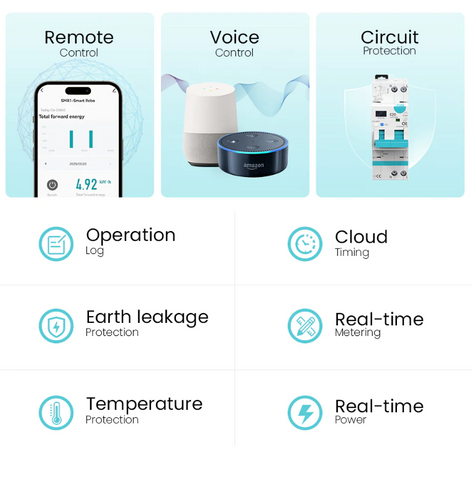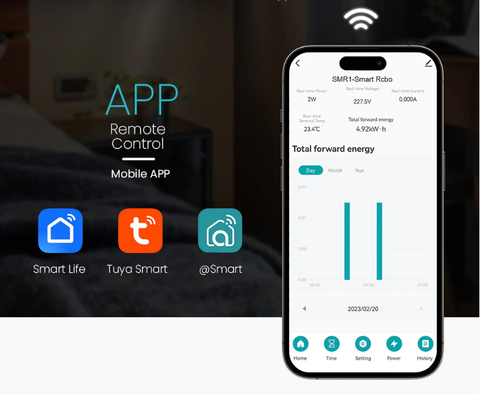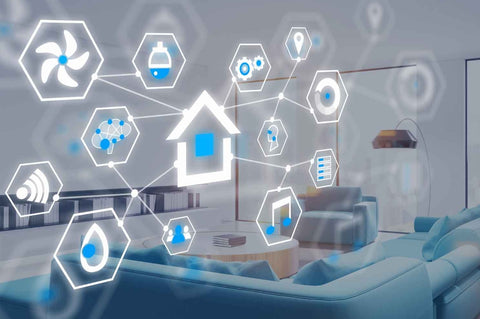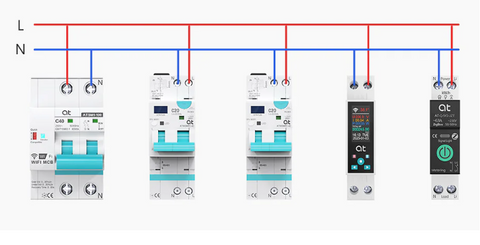Smart Circuit Breakers: Revolutionizing Energy Conservation
In the quest for energy conservation, technology has come to our aid in the form of smart electrical circuit breakers. Smart electrical circuit breakers are not just about safety; they are now at the forefront of energy conservation efforts. These intelligent devices offer a multitude of features that not only make our electrical systems safer but also significantly more efficient. They can help us monitor energy usage in real time, leading to reduced waste and lower electricity bills. Moreover, they enable us to control our electrical systems remotely, offering unprecedented convenience and peace of mind.
Understanding Smart Electrical Circuit Breakers
A. Evolution to Smart Circuit Breakers
The evolution of technology has paved the way for smart circuit breakers. These innovative devices incorporate electronic components and communication capabilities. They are designed to not only protect your electrical system but also provide valuable insights and control over your energy consumption and costs. Unlike traditional circuit breakers, smart circuit breakers can communicate with other devices and systems in your home or workplace.
B. Key Features of Smart Circuit Breakers

Smart circuit breakers come with a range of key features that set them apart from their conventional counterparts:
1. Energy Monitoring
Smart circuit breakers can track and record your energy consumption. This data helps you understand how and when you're using electricity, enabling you to make informed decisions to save energy.
2. Remote Control
You can control smart breakers remotely through a smartphone app or a web interface. This feature allows you to turn off circuits or check their status, even when you're away from home.
3. Load Management
These devices enable you to distribute power efficiently, reducing energy waste. For example, you can prioritize certain circuits or appliances during peak hours.
4. Integration with IoT
Smart circuit breakers can be integrated into your broader Internet of Things (IoT) ecosystem. This means they can communicate with other smart devices, creating a more connected and automated home or workspace.
Benefits of Smart Electrical Circuit Breakers

A. Energy Savings
One of the most significant advantages of adopting smart electrical circuit breakers is the potential for substantial energy savings. These devices provide real-time insights into your energy consumption, allowing you to identify areas of inefficiency. By optimizing your electricity usage and managing loads effectively, you can reduce your energy bills while minimizing your environmental footprint. Smart circuit breakers can help you save energy and money. They allow you to make smart choices through scheduling, automation, or manual control.
B. Safety Enhancements
Smart circuit breakers maintain the fundamental safety features of traditional circuit breakers, but they take it a step further. They can detect abnormalities in your electrical system more accurately and faster. This improved safety feature keeps your home or business safe from electrical dangers and avoids expensive equipment harm. When it comes to safety, smart breakers offer cutting-edge solutions.
C. Remote Control and Monitoring
One of the most convenient aspects of smart electrical circuit breakers is the ability to control and monitor your electrical system remotely. Imagine being able to turn off lights or appliances you accidentally left on while away from home. This feature not only saves energy but also provides peace of mind. Additionally, you can monitor the status of circuits and receive alerts in case of any issues, enhancing the security of your electrical system.
D. Data Insights
Smart circuit breakers provide valuable data insights into your electricity usage. You can access historical data and real-time information about your energy consumption. This information allows you to pinpoint trends and make informed decisions about your energy management strategies. It's like having a window into your electricity usage, enabling you to optimize and tailor your energy-saving efforts more effectively.
How Smart Circuit Breakers Work
A. IoT Integration
Smart electrical circuit breakers leverage the power of the Internet of Things (IoT) to enhance their functionality. They are equipped with sensors and communication capabilities that enable them to collect and transmit data about your electrical system. This data is then processed and made accessible through smartphone apps or web interfaces, allowing you to have real-time insights and control.
B. Energy Monitoring
Energy monitoring is a central feature of smart circuit breakers. These devices continuously track the power consumption of individual circuits, devices, or appliances. By providing detailed data on how much energy is being used, you can make informed decisions about when to use certain appliances or identify energy-hungry devices that may need upgrades or replacements.
C. Load Management
Load management is another crucial function of smart electrical circuit breakers. They allow you to prioritize circuits and devices based on your specific needs. For instance, during periods of high demand, you can allocate more power to essential appliances while reducing power to non-essential ones. This dynamic load management not only conserves energy but also ensures a more stable and efficient electrical system.
Installation and Compatibility
A. Retrofitting vs. New Installations
When deciding on smart circuit breakers, you can either update your current electrical panel or choose a new one. Retrofitting involves replacing traditional circuit breakers with smart ones while keeping your existing electrical panel. This is a more cost-effective option and typically requires less time and effort. If you're building a new home or upgrading your electrical system, a new installation is the best option. It lets you begin anew with smart circuit breakers.
B. Compatibility with Existing Electrical Systems
Smart circuit breakers are designed to be compatible with a wide range of electrical systems. They can work with various voltage levels and circuit configurations, making them versatile for residential, commercial, and industrial settings. Before making a purchase, it's crucial to ensure that the smart breakers you choose are compatible with your specific electrical setup. Manufacturers often provide compatibility information to assist you in the selection process.
C. DIY vs. Professional Installation
The decision to install smart electrical circuit breakers yourself or hire a professional electrician depends on your level of expertise and comfort with electrical work. For retrofitting existing panels, DIY installation is possible for those with knowledge and experience in electrical systems. However, if you're installing a new electrical panel or if you have any doubts, it's highly recommended to hire a licensed electrician. A professional can ensure a safe and compliant installation, reducing the risk of electrical hazards.
Popular Smart Circuit Breaker Brands
A. Overview of Leading Manufacturers
The market for smart electrical circuit breakers has seen a surge in innovative manufacturers, each offering unique products and features. Some of the leading manufacturers in this space include:
1. Eaton
Eaton's smart circuit breakers are designed for energy management, load control, and advanced connectivity. They provide features like energy monitoring, circuit prioritization, and compatibility with popular smart home ecosystems.
2. Schneider Electric
Schneider Electric offers a range of smart circuit breakers under their Wiser brand. Their solutions focus on energy efficiency, remote control, and integration with home automation systems.
3. Siemens
Siemens is known for its comprehensive portfolio of circuit protection devices, some of which have smart capabilities. Their products provide both safety and energy management features.
4. AT-ELE
AT-ELE's smart circuit breakers cater to residential settings. They integrate with their home automation platform, enabling users to manage their electrical system alongside other connected devices.
Real-Life Applications

A. Home Automation
Smart electrical circuit breakers have found a natural home within the realm of home automation. They seamlessly integrate with smart home ecosystems, allowing users to manage their electrical systems through voice commands, smartphone apps, or automation routines. Here are some practical applications:
1. Energy-efficient lighting
Use smart circuit breakers to control lighting circuits, schedules for optimal energy savings.
2. Appliance management
Turn off or schedule the operation of appliances to reduce standby power consumption.
B. Commercial and Industrial Use Cases
Beyond residential settings, smart electrical circuit breakers offer significant benefits to commercial and industrial facilities:
1. Energy management
Businesses can track and manage energy consumption across multiple circuits, identifying areas of improvement and reducing operational costs.
2. Load balancing
For industrial settings with varying power demands, load management features ensure that energy is distributed efficiently and without overloading circuits.
3. Safety and maintenance
Remote monitoring and control enhance safety and simplify maintenance procedures in commercial and industrial environments.
Conclusion
In closing, it's clear that the role of smart electrical circuit breakers extends far beyond just ensuring a safe electrical system. They are instrumental in the broader mission of energy conservation and responsible resource management. Consider embracing smart technology to reduce energy consumption and positively impact the world around you.
Thank you for joining us on this journey into the world of smart electrical circuit breakers and the energy-saving possibilities they offer.
Contact:
AT-ELE
sale@at-ele.com
www.at-ele.com




